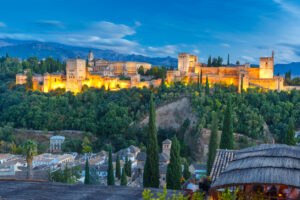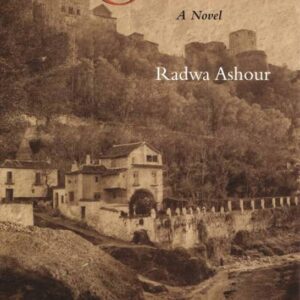Granada, a historical fiction novel written by Radwa Ashour and translated by William Granara, captures the uncertainty of living through moments of great change, as one culture overtakes another. Granada is the first book in a trilogy about the decline of Muslim Spain (al-Andalus).
The novel begins in the year 1492 — which is not only the year in which Columbus set sail but also the year in which the last Muslim ruler of Spain surrendered to the Catholic royals Ferdinand and Isabella. Historians mark this as the final fall of al-Andalus. With the benefit of six hundred years of hindsight, readers know that Spain will become a Catholic country, one which often forgets or represses its Islamic heritage. Yet Ashour’s characters are living through the history as it is made, and they hold out hope that the spirit of al-Andalus will live on.

Granada follows the descendants of Abu Jaafar, a bookseller living in the titular city. The novel centers on Abu Jaafar’s grandchildren, Hasan and Saleema, and his apprentices, Saad and Naeem. Saad falls in love with Saleema, formally joining the family upon their marriage. Naeem remains a friend and companion of the family even after he no longer works for them.
The family navigates love, birth, and death in the midst of an extraordinary political climate which seeks to suppress their culture and identity. As the Catholic Castilians take over, the Arabic language is banned, along with Islam and all its customs. The Muslims of Granada are forced to convert, taking Catholic names and learning Spanish, although they fight to hold onto their true beliefs behind closed doors.
As the fear that their culture is dying takes hold, the characters react differently to their predicament. Unwilling to give in, Saad works with freedom fighters, helping them organize in the mountains. This angers his cautious brother-in-law Hasan, who is terrified that Saad’s activities may endanger the family — which Hasan will sacrifice anything to protect. Nevertheless, Hasan’s sister (and Saad’s wife) Saleema arouses suspicion for her interest in studying medicine, at a time in which Arabic books are banned and women’s education is rare. Meanwhile, Naeem decides to leave Spain altogether, accompanying his new Catholic employer on a voyage to the New World.
Granada is a wonderful book to introduce students to the history of Muslims in Spain, a period which is discussed infrequently. Although the novel is a little slow to start and has a few blind spots (notably the history of Spanish Jews), it soon makes distant historical events come alive through rich descriptions, dynamic storytelling, and fleshed-out characters. The translator includes occasional footnotes as well as a glossary to help readers who are not familiar with Islamic history.
Granada’s author, Radwa Ashour (1946-2014), was a famous Egyptian female novelist and scholar. She was also the first person at University of Massachusetts at Amherst to study African-American literature for her PhD. Her Granada trilogy was selected by the Arab Writers as one of the top 100 Arabic novels of the 20th century.
Discussion Questions:
- The author Radwa Ashour said about her career, “In retrospect I now realize that all my novels are attempts to cope with defeat.” How do you think her statement applies to Granada?
- How does Granada bring together the personal and the political? In other words, how do big-picture historical events affect daily life for the characters?
- What examples do you see of anti-Muslim oppression in the novel? How do the characters deal with a climate which seeks to erase their culture and religion?
- Education (and the threats to it) is an important theme of the novel, beginning with an early scene of book burning. How and why do the characters pursue knowledge? Do you think their beliefs change over the course of the book?


